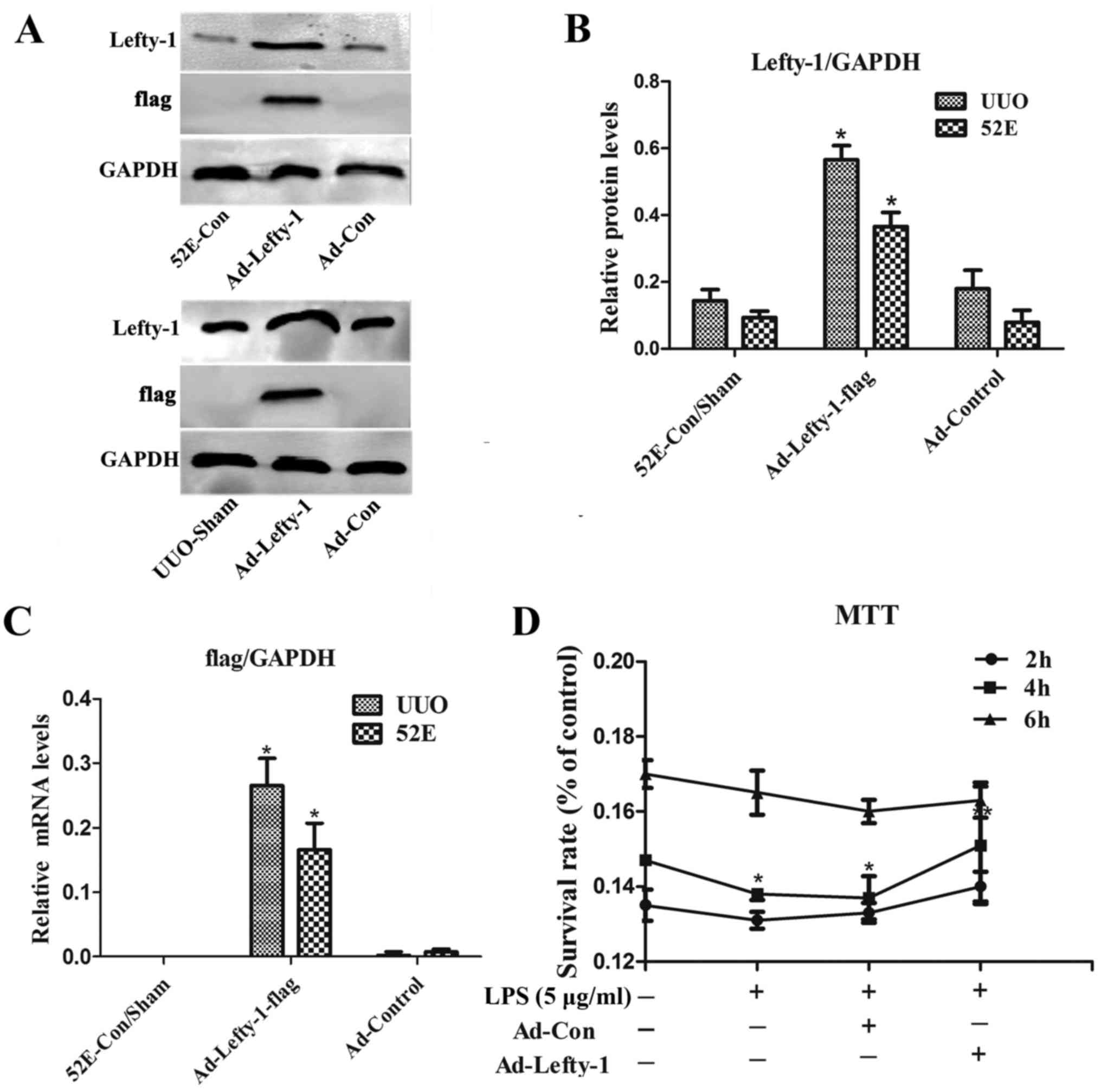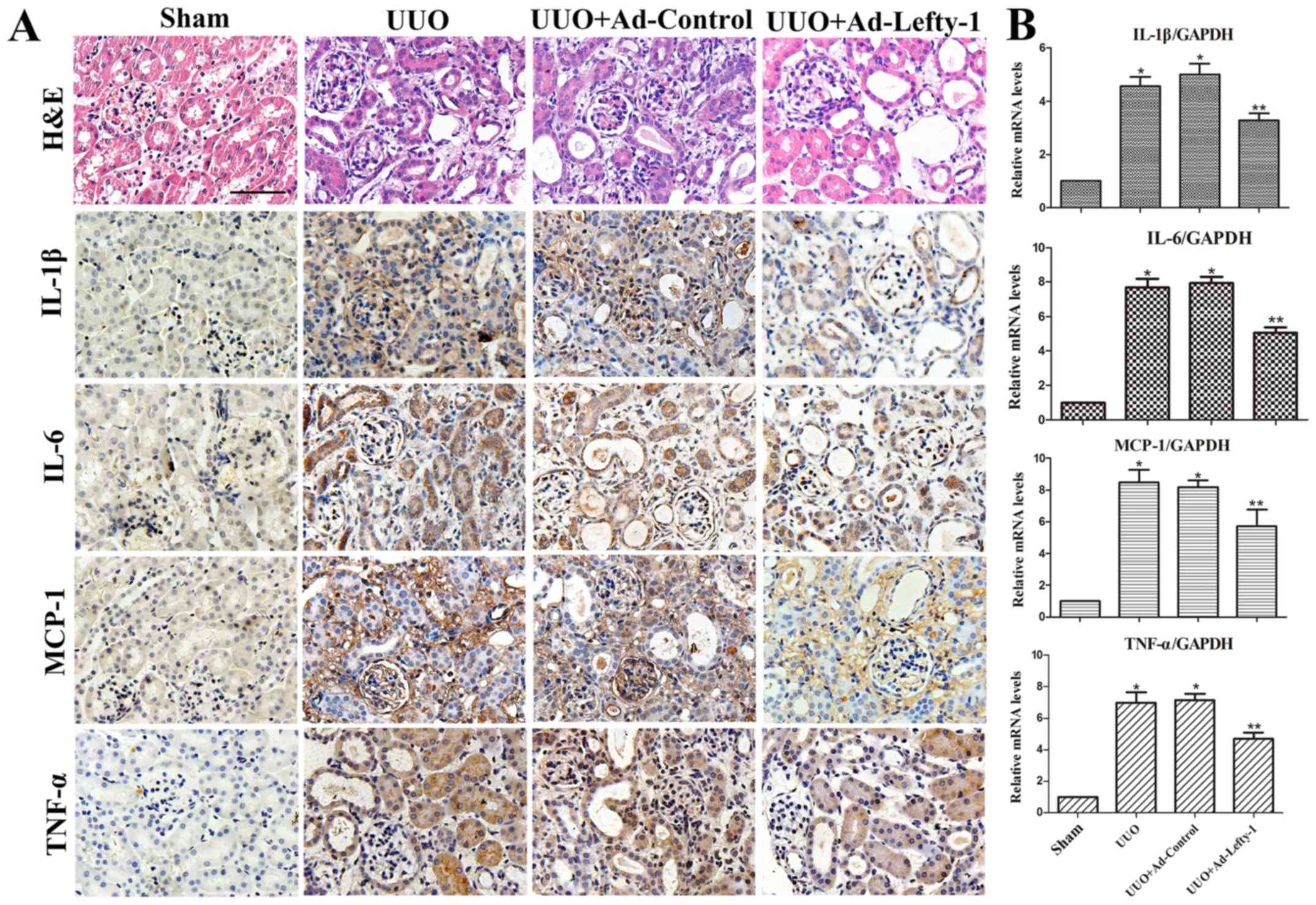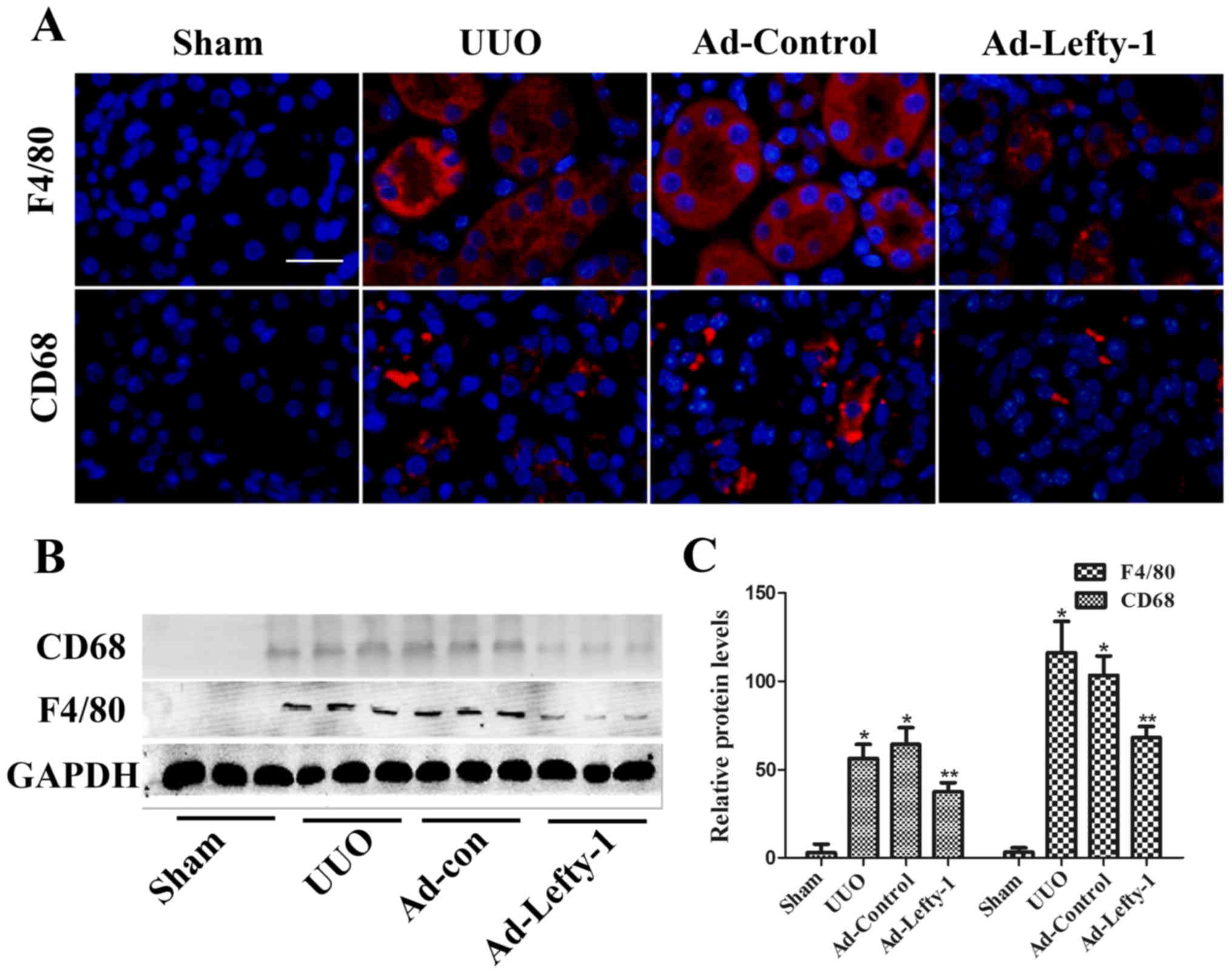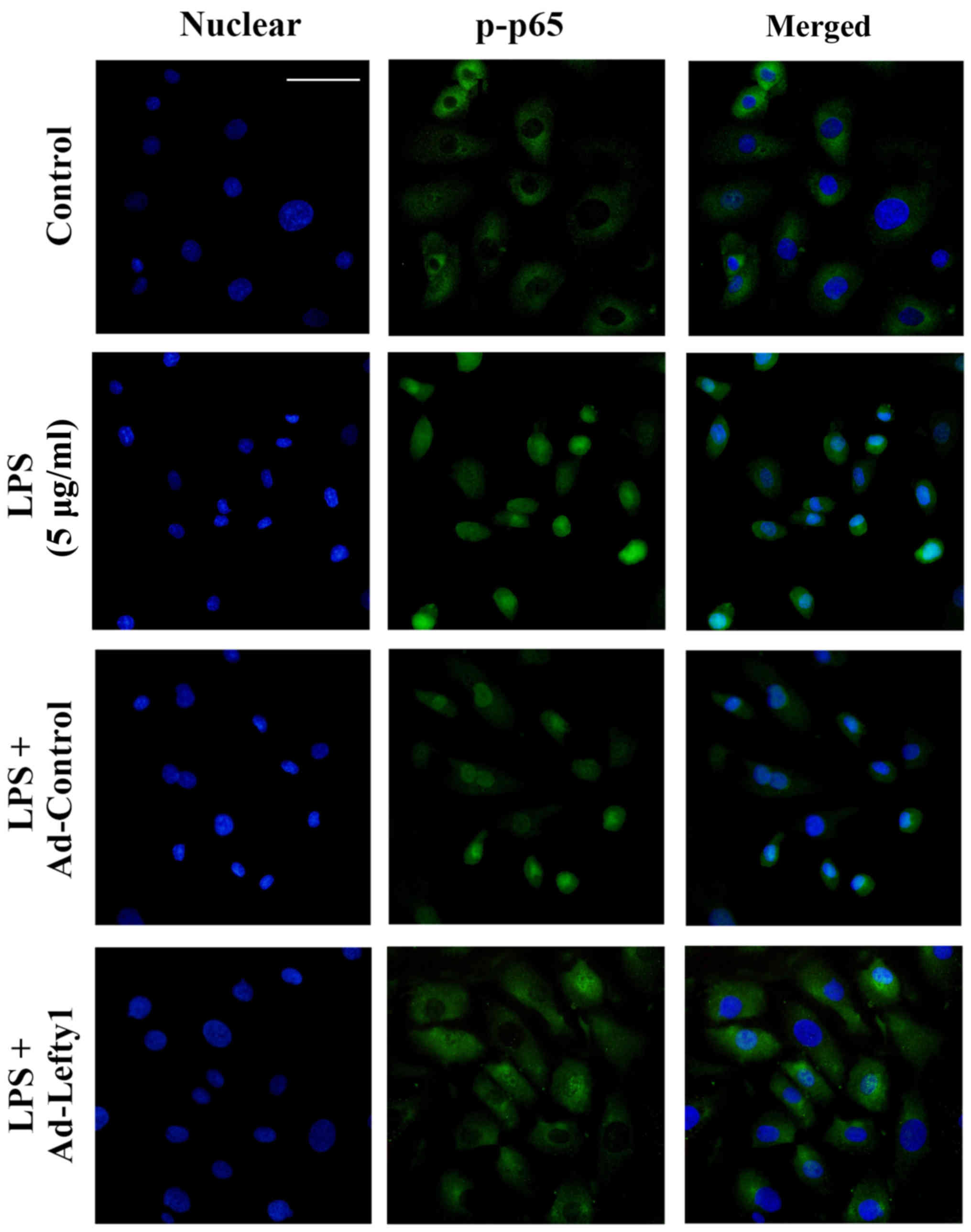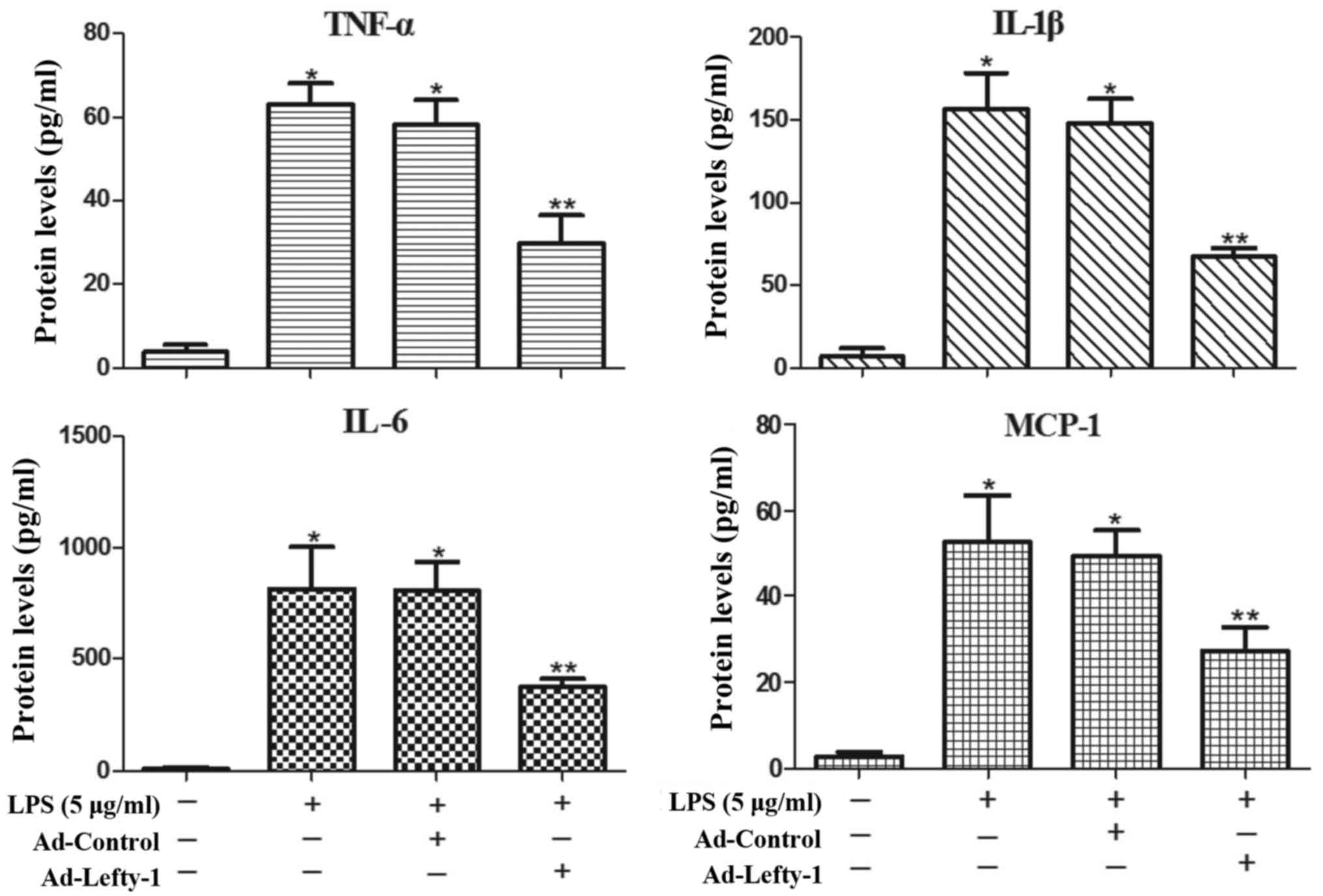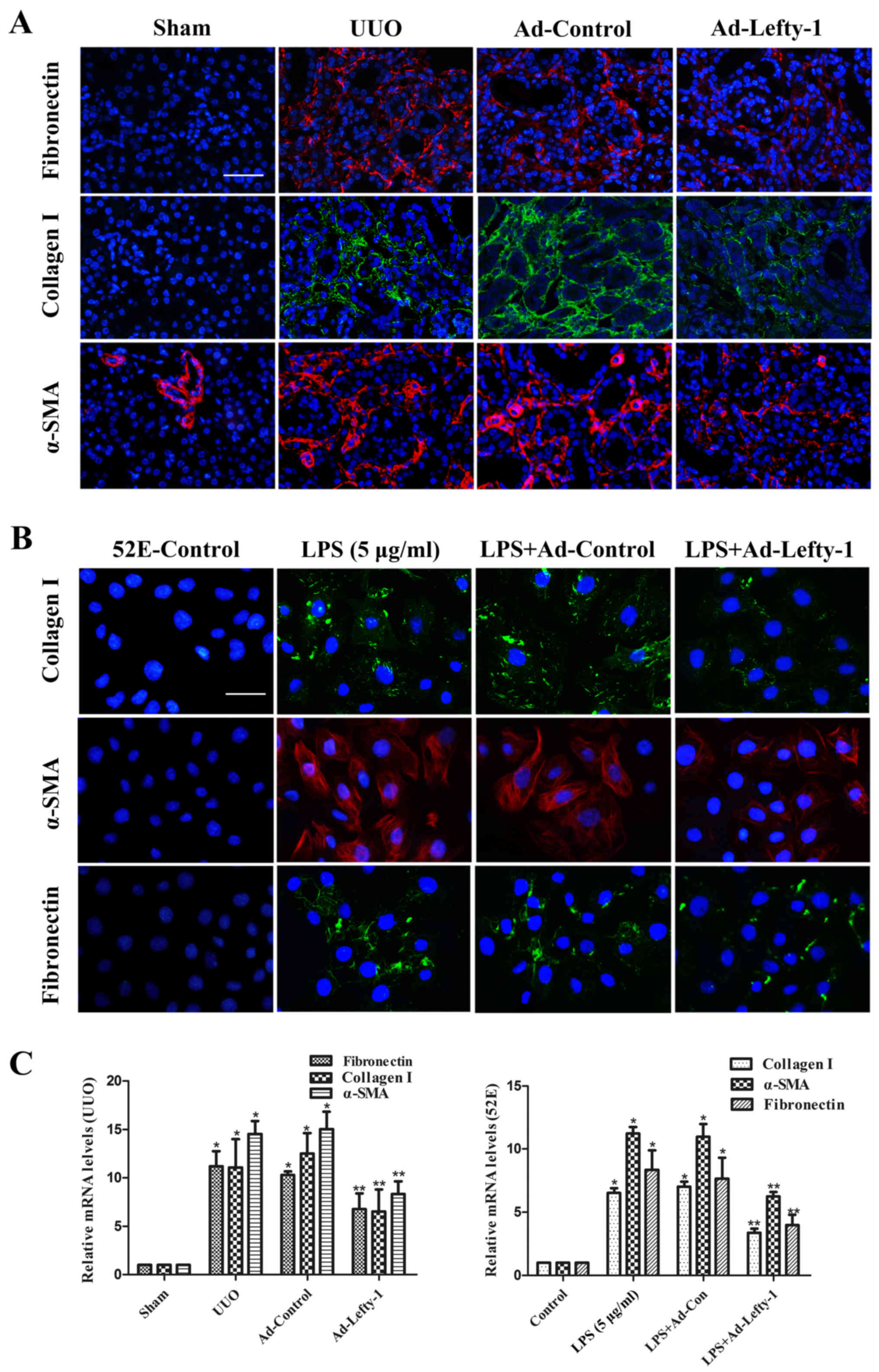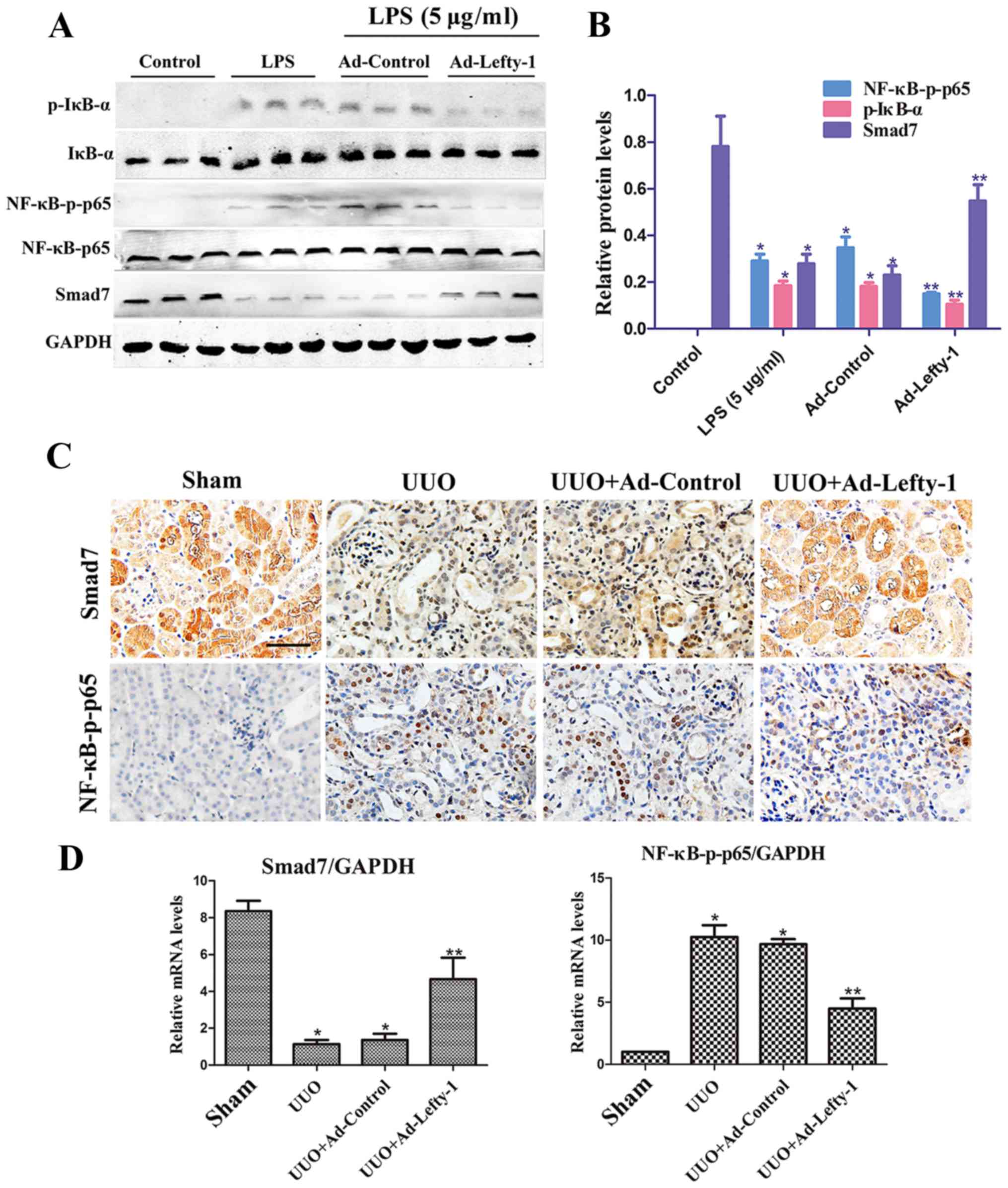|
1
|
Ozaki E, Campbell M and Doyle SL:
Targeting the NLRP3 inflammasome in chronic inflammatory diseases:
Current perspectives. J Inflamm Res. 8:15–27. 2015.PubMed/NCBI
|
|
2
|
Chen J, Zhao Y and Liu Y: The role of
nucleotides and purinergic signaling in apoptotic cell clearance -
implications for chronic inflammatory diseases. Front Immunol.
5:6562014. View Article : Google Scholar
|
|
3
|
Liu Y: Cellular and molecular mechanisms
of renal fibrosis. Nat Rev Nephrol. 7:684–696. 2011. View Article : Google Scholar : PubMed/NCBI
|
|
4
|
Meng XM, Nikolic-Paterson DJ and Lan HY:
Inflammatory processes in renal fibrosis. Nat Rev Nephrol.
10:493–503. 2014. View Article : Google Scholar : PubMed/NCBI
|
|
5
|
Lee SB and Kalluri R: Mechanistic
connection between inflammation and fibrosis. Kidney Int Suppl.
78:S22–S26. 2010. View Article : Google Scholar
|
|
6
|
Rodríguez-Iturbe B and García García G:
The role of tubulointerstitial inflammation in the progression of
chronic renal failure. Nephron Clin Pract. 116:c81–c88. 2010.
View Article : Google Scholar : PubMed/NCBI
|
|
7
|
Mayeux PR: Pathobiology of
lipopolysaccharide. J Toxicol Environ Health. 51:415–435. 1997.
View Article : Google Scholar : PubMed/NCBI
|
|
8
|
Bosshart H and Heinzelmann M: Targeting
bacterial endotoxin: Two sides of a coin. Ann N Y Acad Sci.
1096:1–17. 2007. View Article : Google Scholar : PubMed/NCBI
|
|
9
|
Abdel-Bakky MS, Hammad MA, Walker LA and
Ashfaq MK: Silencing of tissue factor by antisense
deoxyoligonucleotide prevents monocrotaline/LPS renal injury in
mice. Arch Toxicol. 85:1245–1256. 2011. View Article : Google Scholar : PubMed/NCBI
|
|
10
|
Zhong F, Chen H, Jin Y, Guo S, Wang W and
Chen N: Analysis of the gene expression profile of curcumin-treated
kidney on endotoxin-induced renal inflammation. Inflammation.
36:80–93. 2013. View Article : Google Scholar
|
|
11
|
Zhang J, Zheng L, Yuan X, Liu C, Yuan Q,
Xie F, Qiu S, Peng Z, Tang Y, Meng J, et al: Mefunidone ameliorates
renal inflammation and tubulointerstitial fibrosis via suppression
of IKKβ phosphorylation. Int J Biochem Cell Biol. 80:109–118. 2016.
View Article : Google Scholar : PubMed/NCBI
|
|
12
|
Zhou X, Sun X, Gong X, Yang Y, Chen C,
Shan G and Yao Q: Astragaloside IV from Astragalus membranaceus
ameliorates renal interstitial fibrosis by inhibiting inflammation
via TLR4/NF-кB in vivo and in vitro. Int Immunopharmacol. 42:18–24.
2017. View Article : Google Scholar
|
|
13
|
Tabibzadeh S and Hemmati-Brivanlou A:
Lefty at the crossroads of ‘stemness’ and differentiative events.
Stem Cells. 24:1998–2006. 2006. View Article : Google Scholar : PubMed/NCBI
|
|
14
|
Ulloa L and Tabibzadeh S: Lefty inhibits
receptor-regulated Smad phosphorylation induced by the activated
transforming growth factor-beta receptor. J Biol Chem.
276:21397–21404. 2001. View Article : Google Scholar : PubMed/NCBI
|
|
15
|
Li H, Li H, Bai L and Yu H: Lefty inhibits
in vitro decidualization by regulating P57 and cyclin D1
expressions. Cell Biochem Funct. 32:657–664. 2014. View Article : Google Scholar : PubMed/NCBI
|
|
16
|
Cavallari C, Fonsato V, Herrera MB, Bruno
S, Tetta C and Camussi G: Role of Lefty in the anti tumor activity
of human adult liver stem cells. Oncogene. 32:819–826. 2013.
View Article : Google Scholar
|
|
17
|
Tang M, Naidu D, Hearing P, Handwerger S
and Tabibzadeh S: LEFTY, a member of the transforming growth
factor-beta superfamily, inhibits uterine stromal cell
differentiation: A novel autocrine role. Endocrinology.
151:1320–1330. 2010. View Article : Google Scholar : PubMed/NCBI
|
|
18
|
Xu C, Xu M, Wang W and Zhang J: Lefty1
alleviates renal tubulointerstitial injury in mice with unilateral
ureteral obstruction. Mol Med Rep. 13:901–908. 2016. View Article : Google Scholar
|
|
19
|
Ghayur A, Liu L, Kolb M, Chawla A, Lambe
S, Kapoor A and Margetts PJ: Adenovirus-mediated gene transfer of
TGF-β1 to the renal glomeruli leads to proteinuria. Am J Pathol.
180:940–951. 2012. View Article : Google Scholar
|
|
20
|
Georgi MK, Vigilance J, Dewar AM and Frame
MD: Terminal arteriolar network structure/function and plasma
cytokine levels in db/db and ob/ob mouse skeletal muscle.
Microcirculation. 18:238–251. 2011. View Article : Google Scholar : PubMed/NCBI
|
|
21
|
Livak KJ and Schmittgen TD: Analysis of
relative gene expression data using real-time quantitative PCR and
the 2(−Delta Delta C(T)) Method. Methods. 25:402–408. 2001.
View Article : Google Scholar
|
|
22
|
Liu W, Zhu H and Fang H: Propofol
potentiates sevoflurane-induced inhibition of nuclear
factor-κB-mediated inflammatory responses and regulation of
mitogen-activated protein kinases pathways via Toll-like receptor 4
signaling in lipopolysaccharide-induced acute lung injury in mice.
Am J Med Sci. 354:493–505. 2017. View Article : Google Scholar : PubMed/NCBI
|
|
23
|
Anders HJ and Ryu M: Renal
microenvironments and macrophage phenotypes determine progression
or resolution of renal inflammation and fibrosis. Kidney Int.
80:915–925. 2011. View Article : Google Scholar : PubMed/NCBI
|
|
24
|
Lan HY: Diverse roles of TGF-β/Smads in
renal fibrosis and inflammation. Int J Biol Sci. 7:1056–1067. 2011.
View Article : Google Scholar :
|
|
25
|
Brown NJ: Contribution of aldosterone to
cardiovascular and renal inflammation and fibrosis. Nat Rev
Nephrol. 9:459–469. 2013. View Article : Google Scholar : PubMed/NCBI
|
|
26
|
Zhu L, Chen S and Chen Y: Unraveling the
biological functions of Smad7 with mouse models. Cell Biosci.
1:442011. View Article : Google Scholar : PubMed/NCBI
|
|
27
|
Rosa A, Papaioannou MD, Krzyspiak JE and
Brivanlou AH: miR-373 is regulated by TGFβ signaling and promotes
mesendoderm differentiation in human Embryonic Stem Cells. Dev
Biol. 391:81–88. 2014. View Article : Google Scholar : PubMed/NCBI
|
|
28
|
Hu H, Deng F, Liu Y, Chen M, Zhang X, Sun
X, Dong Z, Liu X and Ge J: Characterization and retinal neuron
differentiation of WERI-Rb1 cancer stem cells. Mol Vis.
18:2388–2397. 2012.PubMed/NCBI
|
|
29
|
Miyata N, Azuma T, Hozawa S, Higuchi H,
Yokoyama A, Kabashima A, Igarashi T, Saeki K and Hibi T:
Transforming growth factor β and Ras/MEK/ERK signaling regulate the
expression level of a novel tumor suppressor Lefty. Pancreas.
41:745–752. 2012.PubMed/NCBI
|
|
30
|
Manresa MC, Godson C and Taylor CT:
Hypoxia-sensitive pathways in inflammation-driven fibrosis. Am J
Physiol Regul Integr Comp Physiol. 307:R1369–R1380. 2014.
View Article : Google Scholar : PubMed/NCBI
|
|
31
|
Torres IB, Moreso F, Sarró E, Meseguer A
and Serón D: The Interplay between inflammation and fibrosis in
kidney transplantation. BioMed Res Int. 2014:7506022014. View Article : Google Scholar : PubMed/NCBI
|
|
32
|
Manucha W and Vallés PG: Apoptosis
modulated by oxidative stress and inflammation during obstructive
nephropathy. Inflamm Allergy Drug Targets. 11:303–312. 2012.
View Article : Google Scholar : PubMed/NCBI
|
|
33
|
Declèves AE and Sharma K: Novel targets of
antifibrotic and anti-inflammatory treatment in CKD. Nat Rev
Nephrol. 10:257–267. 2014. View Article : Google Scholar : PubMed/NCBI
|
|
34
|
Bolisetty S, Zarjou A, Hull TD, Traylor
AM, Perianayagam A, Joseph R, Kamal AI, Arosio P, Soares MP, Jeney
V, et al: Macrophage and epithelial cell H-ferritin expression
regulates renal inflammation. Kidney Int. 88:95–108. 2015.
View Article : Google Scholar : PubMed/NCBI
|
|
35
|
Oh SW, Lee YM, Kim S, Chin HJ, Chae DW and
Na KY: Cobalt chloride attenuates oxidative stress and inflammation
through NF-κB inhibition in human renal proximal tubular epithelial
cells. J Korean Med Sci. 29(Suppl 2): S139–S145. 2014. View Article : Google Scholar :
|
|
36
|
Zhong F, Chen H, Han L, Jin Y and Wang W:
Curcumin attenuates lipopolysaccharide-induced renal inflammation.
Biol Pharm Bull. 34:226–232. 2011. View Article : Google Scholar : PubMed/NCBI
|
|
37
|
Hu F, Liang W, Ren Z, Wang G and Ding G:
Surfactant protein D inhibits lipopolysaccharide-induced monocyte
chemoattractant protein-1 expression in human renal tubular
epithelial cells: Implication for tubulointerstitial fibrosis. Clin
Exp Immunol. 167:514–522. 2012. View Article : Google Scholar : PubMed/NCBI
|
|
38
|
Choi YH, Kim GY and Lee HH:
Anti-inflammatory effects of cordycepin in
lipopolysaccharide-stimulated RAW 264.7 macrophages through
Toll-like receptor 4-mediated suppression of mitogen-activated
protein kinases and NF-κB signaling pathways. Drug Des Devel Ther.
8:1941–1953. 2014. View Article : Google Scholar :
|
|
39
|
Oh YC, Jeong YH, Ha JH, Cho WK and Ma JY:
Oryeongsan inhibits LPS-induced production of inflammatory
mediators via blockade of the NF-kappaB, MAPK pathways and leads to
HO-1 induction in macrophage cells. BMC Complement Altern Med.
14:2422014. View Article : Google Scholar : PubMed/NCBI
|
|
40
|
Suh SH, Lee KE, Kim IJ, Kim O, Kim CS,
Choi JS, Choi HI, Bae EH, Ma SK, Lee JU, et al: Alpha-lipoic acid
attenuates lipopolysaccharide-induced kidney injury. Clin Exp
Nephrol. 19:82–91. 2015. View Article : Google Scholar
|
|
41
|
Yan X and Chen YG: Smad7: Not only a
regulator, but also a cross-talk mediator of TGF-β signalling.
Biochem J. 434:1–10. 2011. View Article : Google Scholar : PubMed/NCBI
|
|
42
|
Meng XM, Huang XR, Xiao J, Chung AC, Qin
W, Chen HY and Lan HY: Disruption of Smad4 impairs TGF-β/Smad3 and
Smad7 transcriptional regulation during renal inflammation and
fibrosis in vivo and in vitro. Kidney Int. 81:266–279. 2012.
View Article : Google Scholar
|
|
43
|
Liu GX, Li YQ, Huang XR, Wei L, Chen HY,
Shi YJ, Heuchel RL and Lan HY: Disruption of Smad7 promotes ANG
II-mediated renal inflammation and fibrosis via Sp1-TGF-β/Smad3-NF.
κB-dependent mechanisms in mice. PLoS One. 8:e535732013. View Article : Google Scholar
|
|
44
|
Ng YY, Hou CC, Wang W, Huang XR and Lan
HY: Blockade of NFkappaB activation and renal inflammation by
ultrasound-mediated gene transfer of Smad7 in rat remnant kidney.
Kidney Int Suppl. 67:S83–S91. 2005. View Article : Google Scholar
|
|
45
|
Zhang L, Zhang J, Xu C, Zhou X, Wang W,
Zheng R, Hu W and Wu P: Lefty-1 alleviates TGF-β1-induced
fibroblast-myofibroblast transdifferentiation in NRK-49F cells.
Drug Des Devel Ther. 9:4669–4678. 2015. View Article : Google Scholar :
|















